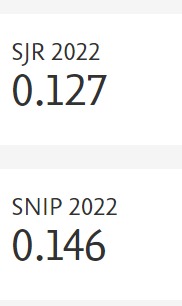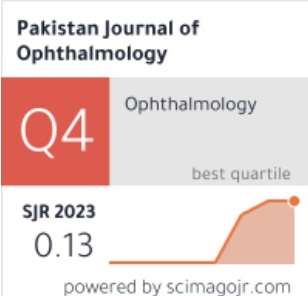Lateral Tarsal Strip – A Method of Choice for Management in Variety of Lower Lid Malposition
Doi: 10.36351/pjo.v38i2.1296
DOI:
https://doi.org/10.36351/pjo.v38i2.1296Abstract
Purpose: To determine the effectiveness of lateral tarsal strip procedure (LTS) in treating different types of lid malposition.
Study Design: Interventional case series.
Place and Duration of Study: Sindh Institute of Ophthalmology and visual sciences from January 2019 to December 2019.
Method: There were 49 eyelids on which LTS procedure was performed. A complete ophthalmic examination was done and patients were assessed for horizontal lid laxity by pinch test. Patients with severe and moderate to severe medial canthal laxity were excluded. Patients with medial ectropion and minimal medial canthal laxity were included in the study where LTS was combined with medial spindle.
Results: Twenty three patients had involutional ectropion. Spindle procedure was performed in addition to LTS in 3 of these 23 patients. Six patients had involutional entropion. One patient had recurrent ectropion and LTS was combined with everting sutures in 3 of them. Five patients had facial palsy and two of them had combined spindle procedure. One patient had traumatic avulsion of lateral canthal tendon which was not repaired primarily. Two patients had previous cantholysis. In one patient LTS was performed to support the prosthesis in a previously eviscerated eye. All the patients underwent LTS with variation in length of lateral tarsal strip which was adjusted to horizontal lid laxity and presumed post-operative position of lower lids in relation to lower limbus and canthal angle.
Conclusion: .Lateral tarsal strip is a simple and effective procedure for correction of different types of lower lid laxity and malposition.
Key Words: Lateral tarsal strip, lid malposition, horizontal lid laxity.
Downloads
Published
How to Cite
Issue
Section
License
Copyright (c) 2022 Fariha sher wali, Adnan Abdul Majeed, Shahzad Memon, Khalid Iqbal Talpur

This work is licensed under a Creative Commons Attribution-NonCommercial 4.0 International License.






